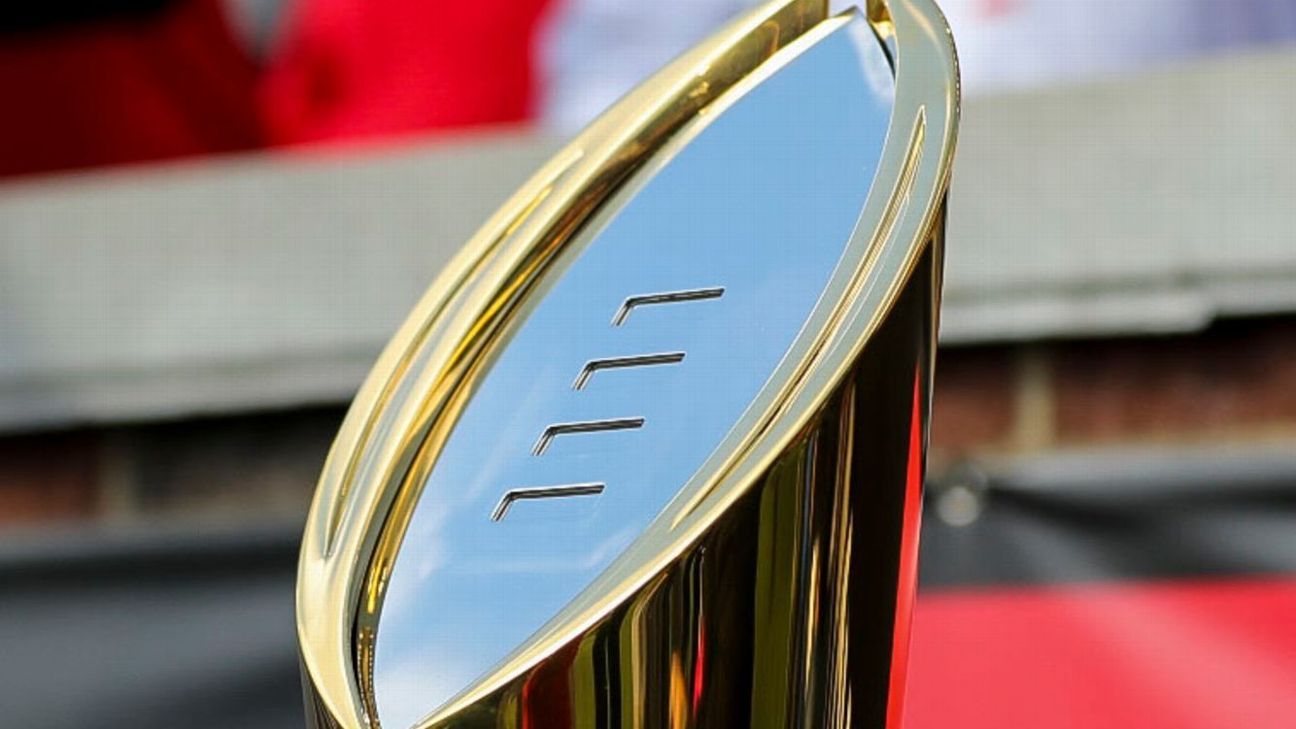A new College Football Playoff policy written this week in response to the surging omicron variant allows for a team to advance to the national championship — and ultimately win it — by its opponents having to forfeit, according to an updated set of COVID-19 policies the CFP released Wednesday.
The changes, which were made by the CFP’s management committee during a videoconference Tuesday, also provide flexibility for the Jan. 10 national championship game in Indianapolis to be pushed back no later than Jan. 14.
If one team is able to play in the title game and the other can’t because of COVID-19 — and the game can’t be rescheduled — the team that can’t play will forfeit and its opponent will be declared the national champion. If both teams can’t play on the original or rescheduled date, the game will be declared a no-contest and the CFP national championship will be vacated for this season.
The CFP is still expecting for all games to be played with no reduction in attendance.
No. 1 Alabama will face No. 4 Cincinnati at 3:30 p.m. ET on Dec. 31 in the College Football Playoff Semifinal at the Goodyear Cotton Bowl Classic. No. 3 Georgia will face No. 2 Michigan at 7:30 p.m. ET on Dec. 31 in the CFP Semifinal at the Capital One Orange Bowl.
If one of the four semifinalists is unable to participate because of a COVID-19 outbreak, the unavailable team will forfeit and its opponent will advance to the national championship.
“As we prepare for the playoff, it’s wise and necessary to put into place additional precautions to protect those who will play and coach the games,” CFP executive director Bill Hancock said in a statement. “These policies will better protect our students and staffs while providing clarity in the event worst-case scenarios result.”
If both teams are unavailable to play in a semifinal game, it would be declared a no contest and the winner of the other semifinal game would be declared the CFP national champion.
The CFP’s announcement came less than 90 minutes after Alabama announced that offensive coordinator Bill O’Brien and offensive line coach Doug Marrone had tested positive for COVID-19. According to a statement from coach Nick Saban and athletic trainer Jeff Allen, both have “very mild symptoms” and are expected to be able to coach against Cincinnati in the Cotton Bowl.
If three semifinal teams are unable to play, the remaining healthy team would win its game by forfeit and be declared the CFP national champion.
A Cincinnati team spokesman told ESPN on Wednesday that 99.6% of the staff and players who will be traveling to the Cotton Bowl are fully vaccinated but declined to say how many have received a booster shot. On Monday, Saban told reporters that more than 90% of the Crimson Tide’s players have been fully vaccinated and received a booster.
Both Alabama and Cincinnati players are allowed to go home for Christmas before traveling to Texas on Dec. 26. Georgia players were allowed to leave Wednesday for the holiday break, but a school spokesman at Michigan said the Wolverines’ plan is to stay on campus and travel to Miami together as a team on the evening of Dec. 25.
Michigan offensive lineman Andrew Stueber told reporters Tuesday that the Wolverines planned to get their booster shots as a team Wednesday. A school spokesperson for Georgia told ESPN that over 90% of the Bulldogs were fully vaccinated as of the SEC championship game.
The CFP also updated its on-site policies, as athletic directors at each school have to certify that everyone with access to the field on game day has tested negative for COVID-19 within 72 hours of kickoff or has been fully vaccinated. According to the new policies, each school will use the same testing arrangement it used during the regular season and will arrange for testing at the game site.
“We certainly wish we were not in this position,” Hancock said, “but the only responsible thing is to take whatever actions we can reasonably take to better protect those who play and coach the game.”
The CFP also set new COVID-19 policies for the Fiesta and Peach bowls, stating that the CFP, the bowl game and ESPN would try to reschedule the game within one week of the original date. If that doesn’t work, the game would be considered a no contest.
The Rose Bowl, which is contractually bound to the Big Ten and Pac-12, and the Sugar Bowl, which has contracts with the Big 12 and SEC, operate under separate agreements and don’t fall under the new CFP guidelines.
A spokesperson for the Rose Bowl Game presented by Capital One told ESPN on Wednesday that if Utah and/or Ohio State are unable to play, whether the game is rescheduled “will be a decision made by the Rose Bowl Management Committee.”
A spokesperson for the Allstate Sugar Bowl, meanwhile, told ESPN that if it’s necessary, the bowl will work with Ole Miss, Baylor and their respective leagues to reschedule.
